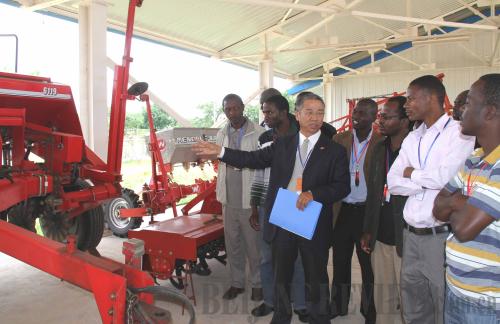|
 |
|
SHARING EXPERTISE: A specialist from China presents modern farming machinery to Zimbabwean agricultural technicians at a Chinese-sponsored demonstration center near Harare on October 15, 2012 (LI PING) |
Trade between China and Africa in 2000 was $10.6 billion, and grew to more than $160 billion in 2011. China has been Africa's top trade partner since 2009, cooperating with African countries in building infrastructure and helping improve the continent's image. China supports Africa by opening markets, increasing assistance and training personnel, and contributes 20 percent of Africa's annual economic growth. Western countries, which have often been suspicious of China's presence in Africa, now acknowledge the country's positive contributions. The Carnegie Endowment for International Peace published an article in February 2012 saying that China is playing an increasingly important role in Africa's development.
Accelerated African integration highlighted Africa's economic growth in 2012. The AU held its 18th summit aiming to promote regional trade in January 2012, presenting the goal of establishing a free trade zone by 2017. It also approved a plan for infrastructure construction, pledging to complete transnational and trans-regional programs and speed up railway and port construction to ease the transportation bottleneck limiting trade development.
In February 2012, Kenya, Ethiopia and South Sudan signed a $24-billion agreement to build a deep-water port and expressways, railways and oil pipelines linking the port to the capital cities of Ethiopia and South Sudan. The Southern African Development Community's 15 members are deliberating a regional transportation blueprint, while in West Africa, a plan is being devised to build a railway connecting six countries in the region.
Remaining risks
While it is certain that sub-Saharan Africa's economy will continue to grow at a fast clip in 2013, hidden troubles remain.
The region is heavily dependent on external investment. The time for Africa's infrastructure construction boom has arrived alongside the deepening of the continent's integration, as trans-regional communication and transportation construction tops the agenda of African governments. African countries needed $93 billion for infrastructure construction every year in the past decade, but they could raise only half of that amount.
An uncertain global economic situation will heighten the danger. The European debt crisis has dragged South Africa down, and if the crisis persists, it could influence the economic development of sub-Saharan Africa. Moreover, the region still struggles with food security issues. Many African countries are not able to provide enough food for their populations. If bad weather causes food price increases, there could be disastrous consequences.
Meanwhile, great powers have hastened competition over Africa. Western countries will expand their military presence, with France already stationing troops in the continent and the United States ready to extend its military reach. As U.S. President Barack Obama declared a new strategy for sub-Saharan Africa in June 2012, the U.S. African Command issued measures to strengthen the country's military program there. The command is planning to dispatch an extra combat brigade of at least 3,000 troops to Africa in 2013. These soldiers are expected to help Kenyan and Ugandan government forces in their fight against the Al Shabaab in Somalia.
The author is deputy director of the African Studies Center at the Shanghai Normal University
Email us at: yanwei@bjreview.com | 